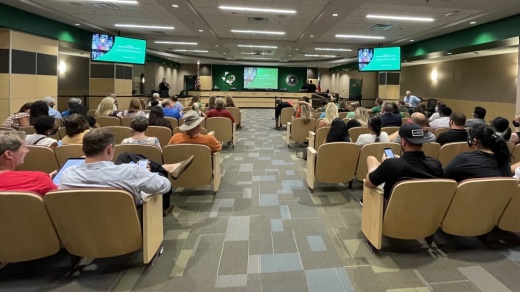The alternative learning options were proposed for students under age 12 who are ineligible for the COVID-19 vaccine at this time, with the intent of receiving state funding from the Texas Legislature’s special session, should Senate Bill 15 pass. The options will be revisited at a later date once more data is collected on the potential number of students who would enroll.
Trustees additionally decided not to make any changes to their current COVID-19 protocols, including masks, which will remain optional. In May, CISD made masks optional effective June 1, following recommendations from its COVID-19 task force.
The board also approved a resolution extending COVID-19 leave for employees who test positive for the virus. The resolution was approved by the district in January and is funded in-house following the expiration of the Family First Coronavirus Response Act in December. The extension will last until June 30, 2022, and will cost the district around $150,000.
More than two hours of public comments highlighted the community’s division over whether the virtual learning options should be offered and whether masks ought to be mandated once more.
While several parents voiced opposition to a mask mandate and a virtual learning option, citing decreasing state test results, others spoke in favor of a mask mandate and advocated for virtual learning options to protect unvaccinated and vulnerable students.
Board members were also divided on whether to offer remote learning options. Board President Michelle Moore and Vice President Eric Lannen both said offering a temporary virtual option could be a compromise for students who are looking for an alternative.
“What I'm sensing is that for all the parents who have voiced their concerns about the pandemic and sending their children to school and being concerned that we're not mandating masks—and instead are kind of looking to us to be able to offer a virtual option right now," Moore said. "We're not serving those families, and I have a problem with that."
Other trustees such as Hannah Smith said implementing a virtual option is both costly to the district and will open the door to additional learning loss.
“I'm not willing to go back to a scenario where we have the ... lack of academic integrity that we had last year,” Smith said. “It feels like we're going backwards again. ... We were moving forwards into this new school year, going back to normal, getting back in person, going back to the normal public school experience—and this just feels again like a step backwards.”
The board was presented with three options for a virtual learning alternative. Each option would be limited to about 20 students per grade level across the district—serving around 2% of the total student body—and would cost around $500,000-$700,000 per semester, depending on the setup.
“I would love for all the kids to receive a quality education, either in person or remotely,” trustee Todd Carlton said. “I don't know that we have the capabilities as it currently stands to deliver a fantastic product remotely. My biggest concern is that we don't have a great grasp on the true cost of delivering a virtual option. We don't know how many students would take advantage of it. We don't know if the state's going to fund a large portion of it.”
At this time, virtual learning remains unfunded by the state Legislature. However, the Texas Senate Education Committee approved a proposal to fund online learning in most school districts during the Legislature’s special session Aug. 10. Until the Legislature commits to any type of funding, local districts will have to self-fund remote learning options.
The district is offering remote conferencing for students who have to miss class due to a positive test or mandatory quarantining.
The dialogue on the matter comes as, on Aug. 23, the Dallas-Fort Worth Hospital Council reported 74 available adult staffed ICU beds in Trauma Service Area E, with 31 beds remaining in Tarrant County. The council also reported 66 confirmed COVID-19 pediatric patients hospitalized as of Aug. 23—compared to 11 pediatric COVID-19 patients July 23.
Several metroplex districts have implemented local policies mandating masks—including Richardson ISD, Dallas ISD and Plano ISD. RISD, PISD and Frisco ISD are now also offering temporary virtual learning options for students aged pre-K through sixth grade until a vaccine is approved for those under 12.





